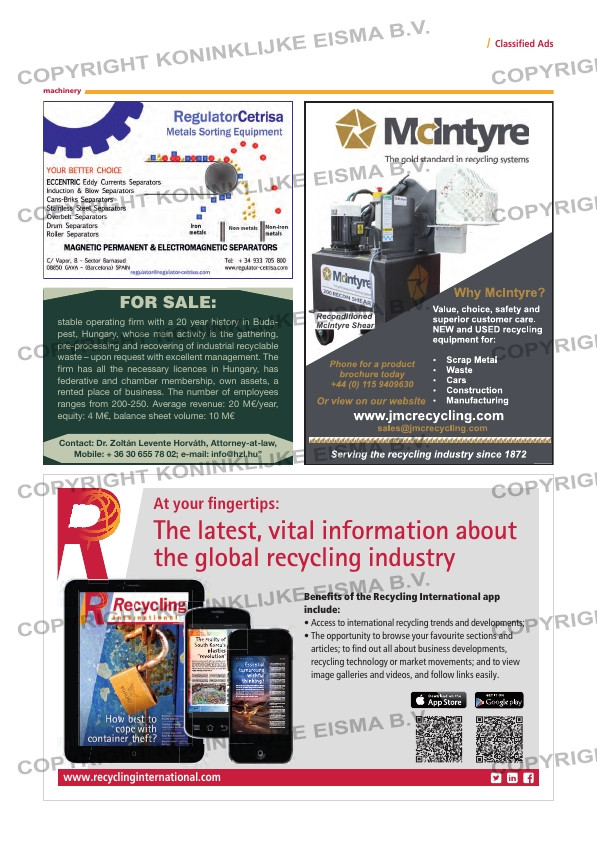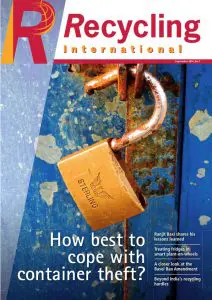Page 73 from: September 2014

Classified Ads
machinery
FOR SALE:
stable operating firm with a 20 year history in Buda-
pest, Hungary, whose main activity is the gathering,
pre-processing and recovering of industrial recyclable
waste – upon request with excellent management. The
firm has all the necessary licences in Hungary, has
federative and chamber membership, own assets, a
rented place of business. The number of employees
ranges from 200-250. Average revenue: 20 M€/year,
equity: 4 M€, balance sheet volume: 10 M€
Contact: Dr. Zoltán Levente Horváth, Attorney-at-law,
Mobile: + 36 30 655 78 02; e-mail: [email protected]”
Benefi ts of the Recycling International app
include:
• Access to international recycling trends and developments;
• The opportunity to browse your favourite sections and
articles; to fi nd out all about business developments,
recycling technology or market movements; and to view
image galleries and videos, and follow links easily.
At your fi ngertips:
The latest, vital information about
the global recycling industry
42 September 2014
The reality of
South Korea’s
plastics
‘revolution’
The stakes are high for South Korea, not least in the plastics recycling sector. The country
has invested heavily in a recycling infrastructure
over a very short period of time – a recycling
‘revolution’ that has been commended time and
again by the BBC and other prominent news
services around the world. But the fact is that
South Korea consumes around 5 million tonnes of plastics per year.
Simply disposing of this material is a problem because of the coun-
try’s small size and dense population. ‘There is no space to sweep
things under the rug,’ observes locally-based B2B intermediary
Latitude 45 Limited. Some domestic companies have adopted latest
recycling technology, but by no means all.
more efficient technology solutions remain
underutilised by most of the industry’s operators.
As an example of what is being achieved,
Samyang Corporation is the largest PET bottle
recycler in South Korea with a yearly turnover
of 18 000 tonnes. Its plant operates 24 hours a
day, sorting plastic bottles and turning them
into flakes that are sold on for use in the manu-
facture of other products such as piping, car
parts and even football kits for the World Cup.
Meanwhile, on the outskirts of South Korea’s
capital Seoul, the recycling centres in Suwon,
Hwaseong and Yongin are the biggest among a
number that are utilising automated sorting
technology, each recycling around 100 tonnes of
municipal waste every day. Up until the 1990s,
this kind of set-up was unknown in South Korea.
New buzzwords
With the economy experiencing growth upon
growth over recent years, waste volumes in
South Korea have increased exponentially. At
first, government policy on waste focused only
on containment. At its worst, the mountain of
waste at Seoul’s main landfill site on Nanji
Island was 34 times larger than the Great Pyra-
mid of Giza.
In the mid-1990s, government policy evolved
to emphasise waste reduction, applying a vol-
ume-based waste fee to households as well as a
waste charge system requiring product manu-
facturers and importers to pay part of the costs
P L A S T I C S By Thomas Vink
Every bale of sorted waste PET bottles that turns up at Samyang’s recycling plant contains roughly 10% different material because it has not
been sorted correctly.
RI-7 Plastics South Korea.indd 42 28-08-14 14:38
www.recyclinginternational.com
46 September 2014
Essential
turnaround
wishful
thinking?
Although the Indian metals recycling industry is striving for
progress, the complications facing the sector are still many in
umber, including in particular: the import duty on all grades
of metal scrap; the inverted customs duty structure; and a
lack of supportive domestic laws and legislation. Alternative
approaches featured high on the agenda at the latest gather-
ing of the Metal Recycling Association of India.
In early August, the Metal Recycling Association of India (MRAI) hosted its third annual gen-
eral meeting and conference. Held in Mumbai,
the event was attended by more than 400 dele-
gates from India and overseas. And in his opening
speech, MRAI president Ikbal Nathani wasted no
time in identifying several of the key issues facing
the country’s metals recycling industry.
‘The challenges facing the Indian metals recy-
cling industry are many – notably, the current
import duties levied on all grades of metal
scrap,’ Nathani said, and he went on to urge the
Indian government to abolish these. Another
concern is that the Indian government has
signed free trade agreements which have result-
ed in an inverted duty structure, under which
finished goods are taxed at a lower rate than
raw materials in order to boost the manufactur-
ing sector. Nathani called on the government
not only to review these trade agreements but
also to promote free trade of metal scrap.
The same speaker also lamented the lack of a
formal, organised metal recycling industry
structure in India, as well as the absence of cen-
tral and state government support to promote
and provide incentives for metals recycling.
‘There are hardly any domestic laws and legis-
lation that assist and apply to the domestic met-
als recycling industry, such as, for instance,
end-of-life vehicle legislation,’ he pointed out.
Nathani also highlighted the desire to create
specially-designated zones for metals recycling
in each of India’s major cities and the argument
for the industry to be given the opportunity to
receive carbon credits.
Industry ‘should be supported’
Shri Kalraj Mishra, union cabinet minister
from the Ministry of Micro Small and Medium
Enterprises, said in response to the MRAI
president’s speech that ‘the recycling industry
should be supported, it should be given prior-
ity and it should be promoted as it is promoted
in China’. He also assured delegates that the
government would look into the problems
addressed by Nathani in the near future.
The presentation from MRAI’s vice president
non-ferrous Dhawal Shah of Metco spotlighted
‘game changers’ in the non-ferrous market. As
Shah saw it, these were: for copper, misrepre-
sented LME inventories and the slowdown in the
Chinese economy; for aluminium, physical mate-
rial still locked in financing deals, with tightening
availability and premiums at their highest level;
M e t a l s i n i n d i a By Manfred Beck
RI-7 India metals.indd 46 28-08-14 15:01
RI-7 Class Ads.indd 73 28-08-14 15:14



